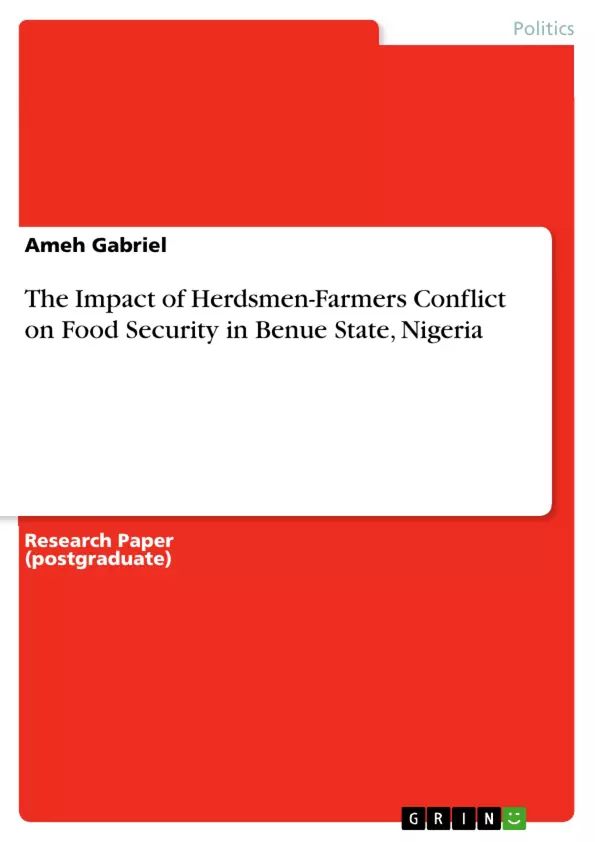The paper investigates the issue of farmers-herders' conflicts and their profound impacts on food security in Benue State, Nigeria. This research employs the qualitative research method, using indepth oral interviews and Focus Group Discussions (FGDs) as tools for data collection. Through an extensive examination of the conflict's causes, effects, and potential mitigation strategies, this study offers a comprehensive understanding of this complex challenge. It finds that the causes of these conflicts are diverse, ranging from illegal encroachments into farmlands, climate change, population growth, and inadequacies in government policies.
These root causes have far-reaching implications for food security in the region. The effects of farmers-herders' conflicts on food security are dire. Loss of human lives, mass displacement, land degradation, and increased hunger have been identified as the significant consequences. These effects compound an already fragile food security situation in Benue State, rendering it a matter of critical concern. In response to these challenges, this research proposes a multifaceted approach to mitigate the conflict's impact on food security. This includes enlightenment campaigns for value reorientation, the replacement of offensive terms and policies, the formation of open public forums for discussions, the avoidance of hate speeches, and the implementation of an effective land distribution approach. These strategies are aimed at fostering unity and understanding between farmers and herders, leading to sustainable peace and ultimately enhancing food security in Benue State.
Inhaltsverzeichnis (Table of Contents)
- Abstract
- Introduction
- Clarification of Concepts
- Herdsmen-Farmers Conflict
- Food Security
- Literature Review
- Methodology
- Data Analysis and Findings
- Discussion and Recommendations
- Conclusion
Zielsetzung und Themenschwerpunkte (Objectives and Key Themes)
This research delves into the multifaceted impact of herdsmen-farmers conflicts on food security in Benue State, Nigeria. The study aims to provide a comprehensive understanding of the conflict's causes, consequences, and potential mitigation strategies, particularly within the context of Benue State's vital role as a major agricultural region in Nigeria. The research seeks to explore the interplay between conflict, agricultural production, and food accessibility, ultimately contributing to the development of effective strategies for promoting peaceful coexistence and enhancing food security.
- The underlying causes of herdsmen-farmers conflict in Benue State.
- The direct and indirect consequences of these conflicts on food security in the region.
- The role of government policies and interventions in mitigating the conflict and its impact on food security.
- The coping strategies employed by rural households affected by the conflict.
- Recommendations for sustainable solutions and policy interventions to address the conflict and its impact on food security.
Zusammenfassung der Kapitel (Chapter Summaries)
The research begins by defining key concepts like herdsmen-farmers conflict and food security, exploring their multifaceted nature and the complex dynamics at play. It then delves into a comprehensive literature review, examining existing research on the topic and highlighting the specific challenges faced by Benue State. The research methodology section outlines the methods used to collect and analyze data, including in-depth interviews and focus group discussions. This section provides a clear overview of the research approach and ensures the credibility of the findings. The data analysis and findings section presents the results of the study, focusing on the specific impacts of the conflict on food security, agricultural production, and livelihoods in Benue State. The discussion and recommendations section analyzes the findings and proposes feasible solutions, including strategies for enhancing agricultural practices, promoting peacebuilding initiatives, and fostering policy reforms to address the conflict and its repercussions. While the conclusion summarizes the research findings and their implications, it is omitted from this preview to avoid spoilers.
Schlüsselwörter (Keywords)
The primary focus of this research is the complex interplay between herdsmen-farmers conflicts, food security, and socio-economic stability in Benue State, Nigeria. Key terms and concepts include: conflict resolution, agricultural production, food security, rural livelihoods, sustainable development, government intervention, peacebuilding, and policy recommendations. The study seeks to understand the root causes of the conflict, analyze its impacts on food production and access, and identify effective strategies for mitigating its effects and promoting peaceful coexistence.
- Quote paper
- Ameh Gabriel (Author), 2023, The Impact of Herdsmen-Farmers Conflict on Food Security in Benue State, Nigeria, Munich, GRIN Verlag, https://www.hausarbeiten.de/document/1445674


